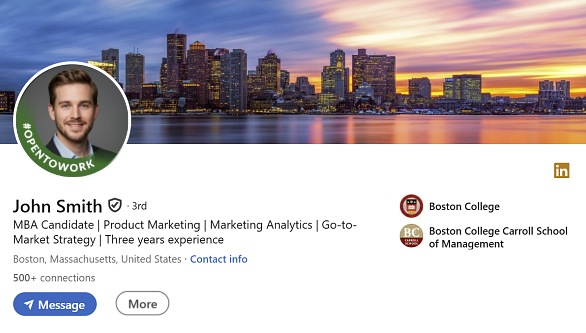
Most colleges fall short in preparing soon-to-graduate students for their job search. While they often stress the importance of having a solid resume, too often they miss offering detailed help on how to build another critical tool for landing a job today: a LinkedIn Profile.
There’s no required class, no how-to manual, and no standout examples. Once you graduate, you’re on your own, left to figure out how to establish a strong LinkedIn presence. That’s a significant oversight because this Profile has become a must-have for any job seeker.
You know how important your resume is; well, LinkedIn is just as important.
Why? Recruiters spend a significant portion of their day on LinkedIn reviewing applicants and searching for new ones. Hiring managers may review your Profile before extending a job offer or inviting you to an interview. Sometimes, the employer discovers you on LinkedIn and reaches out to you about the opportunity, but only if your Profile is complete, optimized with relevant keywords, and effectively presents you as a strong potential employee.
Your Profile is your personal brand. It is advertising who you are to the world. It can’t be incomplete, ignored, or only have a few connections. Your Profile needs to market you in the best possible light.
As a career counselor, I work with many new graduates on their job search, and I see the same LinkedIn profile mistakes over and over again. You need to avoid these pitfalls to be found, get asked to interview, and then receive the offer. Follow my guide below for the steps you must take to avert job-killing mistakes and create a LinkedIn Profile that is complete and impressive to employers.
Headline
This is the most searched part of LinkedIn. Writing your LinkedIn headline for Search Engine Optimization (SEO) and relevant keywords is crucial to enhancing your visibility in LinkedIn’s search results.
There is a formula that works best with the platform’s algorithm. You should add these items to the headline:
- New College Graduate
- Your major
- Special credentials
- Years of professional experience — typically internships.
Each set of keywords is separated by using a horizontal slash symbol. Be sure to add the work experience you’ve gained during your internships, leadership roles, or relevant volunteer work. They often come out to be 1-2 years of experience, so you want to highlight that.
Here are two examples:
Marketing | New College Graduate l Social Media l Content Creator l Graphic Designer l One year of experience
Software Engineer l Computer Science major l New College Graduate l Full Stack l Advanced Python, Java, C++ programming skills l Two years of experience.

Your Photo
Many job seekers are unaware of the negative impact a poor picture has on how employers, particularly recruiters and hiring managers, perceive their Profile.
Photos are often blurry because they have been enlarged too much. Others appear to have been cut out of a group or family photo. It’s typical to see men dressed in suits and ties, which seems old-fashioned and outdated and doesn’t align with the business casual world. Ladies often select a graduation picture with a sash, holding or wearing a cap. Both convey the wrong image, as we want to see the professional you of today, not the college student.
You can easily capture the perfect picture using a cell phone. Start with a plain background and good light to illuminate your entire face. Smile and maintain an engaging, warm, and friendly look. Ladies should wear a solid-colored, nice blouse or dress — nothing low-cut, sheer, or sleeveless. Men should wear a solid-colored collared shirt. Crop the photo so it’s a headshot, and you’re off to a great start.
Get your career off to the right start
Work Experience
Internships are crucial to emphasize, but most students do not highlight all the skills they used or learned during this time. Evaluate what you accomplished on the job.
Did you create something new? You may have improved a system or established a process that saves time. Did you work on a collaborative team? List these. Mention any key results you had first. Include hard skills, such as research and technical skills, and soft skills, such as writing and leadership.
Then, take it one step further and investigate some job opening descriptions for the job title you are looking for, ensuring they are entry-level positions. Highlight what they are looking for. Is it time management or collaboration skills? Analytical ones? Problem-solving skills? Be sure to add these to your work experience description for any job you held, wherever possible.
No internships or minimal experience? Think about any relevant projects you worked on in college and list them. Label them as “Academic Projects.” Describe your actions and the skills you utilized during these projects. Examples might include: Applied principles of artificial intelligence, probability, and robotics to develop an algorithm.
Also, review your transcript and list the relevant coursework in the Education section. Where you list the degree, you’ll find a “description box.” Add the academic course list there.
ABOUT Section
This is not a summary of your work and academic background. That information is in the other sections. Here, we want to know more about you as a person. Share why you chose your major, along with a few relevant points for the type of job you want. Add a bit of personal information.
One business major demonstrated his entrepreneurial skills by writing about how he paid 50% of his education costs working as a wedding photographer. Another new grad pointed out his teamwork and drive, citing his experience as a Division 1 student-athlete. Someone else discussed their study abroad experience learning about global politics.
You should end this section by stating the job you are seeking. Use a new paragraph that states:
“I’m looking for a Data Analyst job. (fill in your job title). If you have a position to discuss, please email, and list your email address.
Profile Background
Behind your picture is the LinkedIn default image. I recommend replacing it with a photo that has more appeal. Cityscapes, skylines, nature scenes, industry–specific designs, simple creative designs, or abstracts are all good options. LinkedIn reports that 73% of users are on their mobile phone when using the platform, so having a background image with no words works best on the tiny screen.
Turn on the Open to Work Tag
For new graduates, the feedback I get from recruiters is that they prefer to see the “open for work” tag around your photo as it tells them you are a potential job candidate. They recommend using it.
Under your headline, you’ll find the “open to” tab; click, and then select “finding a new job.” Complete this section, and at the bottom of the questions, select the “open to work” tag so everyone on LinkedIn can see you are available.
Reflect and Take the Time
Creating a successful LinkedIn profile for new graduates takes some reflection and time. It must be impressive to be effective, which is essential to your job search.


